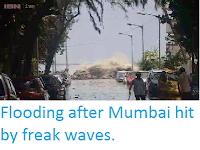The number of known deaths has risen to 111 in flooding associated with the onset of the Asian summer monsoon in the Indian state of Gujarat after the bodies of a family of seventeen in the village of Khariya in Banaskantha District, and it is feared that many more bodies will be discovered as the floodwaters recede. Many of the worst ht areas were along the banks of the river Banas, where water was released from the Dantiwada Dam at an increased rate after floodwaters from Rajasthan threatened to overstress the dam. This led to a number of villages close to the river being inundated. A similar release of waters from the Sipu Dam has also lead to flooding on the Sipu River.
Flooding in Banaskantha District, Gujarat, on 25 July 2017. IANS.
Monsoons
are tropical sea breezes triggered by heating of the land during the
warmer part of the year (summer). Both the land and sea are warmed by
the Sun, but the land has a lower ability to absorb heat, radiating it
back so that the air above landmasses becomes significantly warmer than
that over the sea, causing the air above the land to rise and drawing in
water from over the sea; since this has also been warmed it carries a
high evaporated water content, and brings with it heavy rainfall. In the
tropical dry season the situation is reversed, as the air over the land
cools more rapidly with the seasons, leading to warmer air over the
sea, and thus breezes moving from the shore to the sea (where air is
rising more rapidly) and a drying of the climate. This situation is
particularly intense in South Asia, due to the presence of the
Himalayas. High mountain ranges tend to force winds hitting them
upwards, which amplifies the South Asian Summer Monsoon, with higher
winds leading to more upward air movement, thus drawing in further air
from the sea.
Diagrammatic representation of wind and rainfall patterns in a tropical monsoon climate. Geosciences/University of Arizona.
See also...
Follow Sciency Thoughts on Facebook.








